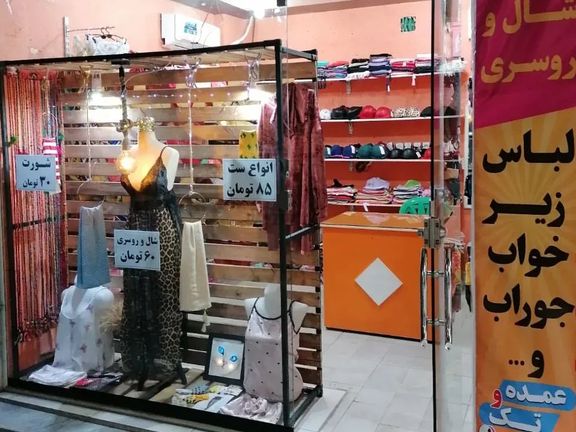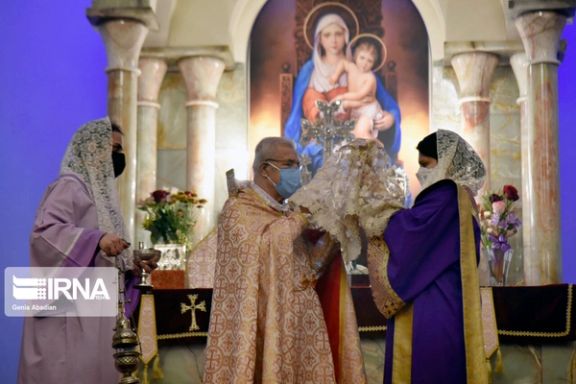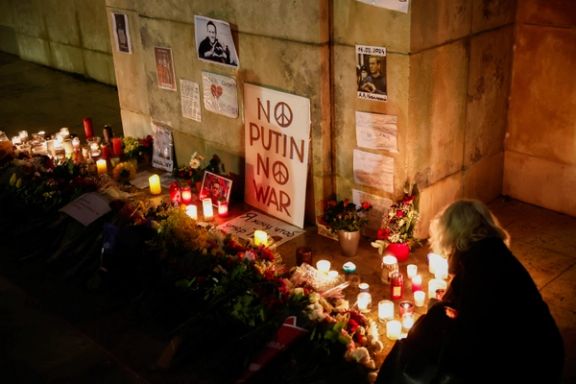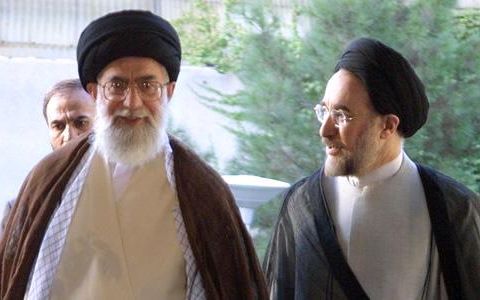Women's Underwear Store Sealed In Iran Due To Male Shopkeeper

A women's underwear store in Iran’s religious city of Mashhad was sealed by authorities due to its having a male shopkeeper, in further economic and social crackdowns by authorities.

A women's underwear store in Iran’s religious city of Mashhad was sealed by authorities due to its having a male shopkeeper, in further economic and social crackdowns by authorities.
Mohsen Seyyedi, the Manager of Inspection and Supervision of Guilds in Khorasan Razavi Province, made the announcement regarding the closure of the shop situated on 17th of Shahrivar Street in Mashhad.
Seyyedi emphasized that the store, which primarily sold women's clothing, “engaged in unconventional behavior through its online advertising.” He stated that the sale of women's underwear should be exclusively conducted by female sellers.
Iranian regulations and restrictions concerning women's underwear stores are deeply influenced by cultural, religious, and legal considerations. The regulations mandate that such establishments must be operated by female shopkeepers, aligning with Islamic norms regarding “modesty and privacy”. Additionally, the advertising and display of women's underwear is generally forbidden.
Iranian authorities have in the past issued warnings to shop owners regarding the display of female mannequins wearing underwear or curve-revealing clothes.
The crackdown is part of a broader campaign against women's clothing and hijab, intensified following protests following the death in custody of Mahsa Amini in 2022.
Since the Islamic Revolution in 1979, Iran's government has imposed restrictions on dress, requiring women to cover their hair and encouraging the wearing of traditional head-to-toe garments.

The 2023 annual report by the London-based organization, Article18, has revealed an increasing number of Christians arrested in Iran last year, up from 134 to 166 since 2022.
The report, titled 'Faceless Victims: Rights Violations Against Christians in Iran', co-released with Open Doors, CSW, and Middle East Concern, highlights the plight of numerous victims whose identities remain undisclosed due to fears of exacerbating their situation.
The arrests occurred in waves throughout the year. "Just a handful reported prior to June, then over 100 within the next three months, before a further rash of arrests at Christmas," the report states, underscoring the sudden spikes in persecution faced by the Christian community.
"At least 17 of the Christians arrested during the summer had received prison sentences of between three months and five years, or non-custodial punishments such as fines, flogging, and in one case the community-service of digging graves," researchers stated.
Only two individuals, Elisa Shahverdian and her husband, Hakop Gochumyan, were identified among those arrested during the summer, with Gochumyan still detained in Evin Prison.
Even when released from prison, the harassment continues, the report states, with seven different types of post-prison pressure listed, including continued monitoring, denial of employment and education, new charges or reopened cases. All of which, “make it increasingly difficult for Christians to remain in Iran”.
Like many escaping the regime, the report notes that “many [Christians] flee ... only to find a new set of challenges awaiting them as refugees".
Bible distributors are among the most harassed targets, with "over one-third of arrests targeting individuals in possession of multiple copies."
The Abrahamic faiths, Christianity, Islam and Judaism, are the only legal religions in Shia majority Iran, but Sunni minority Muslims, Jews and Christians continue to face persecution. Other minorities such as the 300,000 strong Bahai community, face systematic persecution.

In the annals of Russian history, few figures stand as tall as Alexei Navalny. His name has become synonymous with courage, resilience, and unwavering commitment to justice in the face of oppression.
From surviving a poisoning attempt orchestrated by the Kremlin, to boldly returning to Russia despite the risks, Navalny's journey embodies the spirit of defiance against tyranny.
Navalny's activism began long before his poisoning in August 2020. As a prominent anti-corruption crusader and political opposition leader, he had long been a thorn in the side of Vladimir Putin's regime. His relentless investigations into corruption at the highest levels of government exposed the rot at the core of Putin's rule, earning him both admiration and ire from supporters and adversaries alike.
But it was the brazen attempt on Navalny's life that catapulted him onto the international stage and transformed him into a symbol of resistance against Putin's authoritarian regime. Despite suffering near-fatal poisoning with Novichok, a deadly nerve agent, Navalny defied the odds and survived. His recovery, against all odds, was a testament to his resilience and determination to continue the fight for justice.
Navalny's return to Russia in January 2021, just months after his poisoning, further underscored his unwavering commitment to his cause. Despite the genuine threat to his life, he chose to confront his would-be assassins head-on, declaring, "I'm not afraid." His defiance in the face of danger inspired millions of Russians who yearned for change and galvanized a new wave of opposition to Putin's regime.

Navalny’s life and death has undoubtedly left a deep impression on activists facing tyrannical regimes around the world, including in Iran, where hundreds of dissidents suffer isolation and often torture in prisons. Many Iranians voiced outrage upon hearing the news of his passing in a Gulag prison, flooding social media with messages of support.
In his powerful courtroom speech during his trial, Navalny minced no words in condemning Putin and his cronies for their corruption and oppression. He spoke not just for himself but for the millions of Russians who have suffered under Putin's rule. His words were a rallying cry for those who refuse to be silenced by fear, a call to action for all who believe in democracy and human rights.
Navalny's court defense succinctly highlights his defiance against Putin's regime and his unwavering commitment to justice. He accuses Putin of orchestrating his assassination attempt, asserting that his persecution stems from Putin's fear and hatred towards him for surviving the attempt. Condemning Putin as a cowardly "little man in a bunker," Navalny accuses him of resorting to murder to maintain power and brands him as "Vladimir the Underpants Poisoner." He challenges the trial's intimidation tactics, asserting that locking up one man cannot instill fear in millions. Navalny pledges to continue fighting despite facing imprisonment and urges others to do the same, demanding proper justice and fundamental rights such as participation in elections and equitable distribution of national wealth.

Navalny's activism, however, did not go unchallenged. Putin's regime, notorious for its brutal crackdowns on dissent, spared no effort in trying to silence Navalny and his supporters. From arbitrary arrests and politically motivated prosecutions to the use of state-sponsored violence, the regime sought to crush any opposition to its rule.
But Navalny remained undeterred. His courage in the face of adversity inspired countless Russians to join the fight for freedom and justice. His message resonated with those who had long suffered under Putin's repressive regime, giving voice to their aspirations for a better future.
As we mourn Navalny's passing, we must also celebrate his life and legacy. His death in prison is a tragic reminder of the lengths to which Putin's regime will go to cling to power. But it is also a testament to Navalny's unwavering commitment to his principles and willingness to sacrifice everything for the cause of justice.
As we honor Navalny's memory, let us renew our commitment to the values for which he fought so tirelessly. Let us demand justice for Navalny and all those whom Putin's regime has silenced. And let us continue to pressure Putin and his chain of corruption until justice prevails and freedom triumphs.
Let us call for the free world to recognize the severity of the situation in Russia under Putin's rule, rejecting the notion that continued dialogue will lead to meaningful change and instead urging decisive action, including the non-recognition of the upcoming Russian election. International solidarity is needed in addressing the crisis in Russia. It is time for the free world to stand up to Putin's tyranny and demand justice for the people of Russia.
As Navalny famously stated in an Oscar-winning 2022 documentary about his life by Canadian director Daniel Roher, "If they decide to kill me, You're not allowed to give up. If they decide to kill me, it means that we are incredibly strong. We need to utilize this power not to give up, to remember we are a huge power that these bad dudes are oppressing."
As he asked, we can't lose hope and must continue the fight. Dictators never rest, and neither can we. Let us join together, wiping away our tears, and pick up where he left off, standing firmly for justice and freedom.

While Iran funds billions of dollars into its regional proxies, retirees have been given a minimal new year bonus which falls far short of covering even the most essential expenses amidst the country's economic disaster.
Maryam Shokrani, an economic reporter, vocalized the frustration felt by many, stating, "They have deposited 25 million rials (less than 50 dollars) as pensioners' Eid gift; the money is equivalent to four pizzas and side dishes. Aren't they ashamed?!"
In Iran, the anticipation of the Muslim holiday of Eid which follows the Holy Month of Ramadan which begins next month, or the Iranian New Year, beginning on March 21, is often accompanied by the hope of receiving a bonus from employers.
The amount allocated for Eid or New Year bonuses has dwindled to such an extent that it no longer holds the purchasing power it once did. For countless families, the bonuses have become mere tokens, scarcely enough to cover basic necessities, let alone indulge in the customary tradition of purchasing new clothes for the occasion.
The size of the bonuses reflects broader economic challenges facing the country, including inflation and currency devaluation, which have eroded the value of salaries and bonuses alike.
In a bid to appease a disillusioned public on the eve of upcoming elections, Iranian workers are set to receive a government approved average salary increase of 20 percent starting in March, amid an annual inflation rate of around 50 percent. The new minimum monthly wage has been set at 115 million Iranian rials or about $230.
It comes as a slap in the face for workers and retirees alike. Iran's proxies across the Middle East from Lebanon to Yemen and beyond, received billions of dollars every year in funding, training and weapons from the regime, to the detriment of the country's civilians who have been pushed into the depths of poverty. Gaza-based Hamas alone has been receiving around $100 million from Iran for at least a decade according to the US Treasury while Lebanon and Yemen receive much higher patronage.

Masoumeh Ahmadi, the mother of Mohammad Ghobadlou, a protester executed last month, has accused the government of falsifying his last will and testament before his execution.
In an Instagram post on Monday, Ahmadi said, "This is neither Mohammad's handwriting nor his signature," underscoring the lack of authenticity. "They did not allow my son the opportunity to say goodbye to his family and bid us farewell."
The document shows a pre-prepared form outlining religious rituals after execution, with handwritten entries and a signature below. However, certain sections, notably the 'remarks' section, remain conspicuously blank, raising suspicions of manipulation.
"The lies continue," Ahmadi fumed. "I wish there were consequences for lying."
The revelation comes just days after Ghobadlou's lawyer was summoned to court for criticizing the handling of the trial. His legal team denounced the execution as "state murder" after he was charged with "waging war against God" and "corruption on earth" for his alleged involvement in assaulting and killing a special forces officer during protests in 2022.
So far, at least nine protesters have been executed in connection with the Women, Life, Freedom protests, amidst a record wave of executions last year amid deepening crackdowns.

In a significant shift from his previously conciliatory stance, former President Mohammad Khatami has asserted that the upcoming elections are far from being free, fair, and competitive.
According to Jamaran News website, speaking to the leaders of Hambastegi [Solidarity], one of Iran's smallest Reformist parties, Khatami highlighted widespread dissatisfaction among educated youth, elites, and over 50 percent of the population who abstained from voting in the 2020 and 2021 elections. He also noted millions who cast blank votes.
Khatami cautioned the government against assuming satisfaction among past election participants with the country's situation. He emphasized the need for competitive, free, and fair elections, advocating for representation of reformists, conservatives, and all Iranians. He urged the government to address existing dissatisfactions seriously to ensure future elections are fair.
Khatami cautioned the government that "it should not assume that those who voted in the past two elections are necessarily happy about the country's situation."
Khatami further said, "A free, fair, and competitive election is an election in which not only the reformists and conservatives, but also all other Iranians can have their own candidates." He expressed hope that "the government takes the existing dissatisfactions seriously and paves the way for free and fair elections in the future."
Since the establishment of the Islamic Republic in 1979, only individuals loyal to the clerical regime have been permitted to run in elections. Those with dissenting views not only faced bans on political activities but also risked arrest and lengthy prison terms.

In another development, Mohammad Taghi Akbarnejad, a conservative cleric at the Qom seminary was arrested on February 17 for his critical comments about the upcoming elections and Supreme Leader Ali Khamenei and his regime's track record during the past 45 years. Akbarnejad said in a video that went viral on social media that "both voting and not voting in the elections carry a message to the government and reflect people's reaction to the officials' [objectionable] performance."
He also compared Iran's economic situation to those of China and South Korea: "This government has had 45 years to prove itself. It has been in control of a wealthy country for 45 years. We own eight to nine percent of the wealth of the whole world. In the modern world 45 years is a lot of time. China has become [modern] China during the past 45 years. South Korea has become what it is during the same 45 years."
Iran’s GDP is less than half of its neighbors Turkey and Saudi Arabia, while before the revolution it was the leading economic power in the Middle East.
Akbarnejad continued to make startling remarks as a conservative cleric. He directly challenged the leaders of the Islamic Republic by questioning the practical benefits of their religion for the people. "I do not believe in a religion that does not serve the nation's interests," he boldly declared. It's worth noting that, as a devout Muslim, he was questioning the application of religious principles by the rulers rather than expressing disbelief in religion itself.
Following his arrest, the number of his followers on Instagram rose from around 1,000 to over 93,000.
In yet another development , following a panel discussion about the election at the University of Tehran, which turned out to be mainly about the expected low turnout, former government spokesman Ali Rabiei wrote about his take on the reasons for a likely low turnout in an article for Etemad Online website.
"When those in power are not prepared to make any compromise, the society falls out with the government and avoids any form of reconciliatory behavior," he argued.
He censured a small yet powerful faction for engineering a political deadlock fueled by narrow factional interests, which prioritizes their own agenda over national security. Rabiei concluded by asserting that Iranians are utilizing the elections as a platform to articulate their discontent.